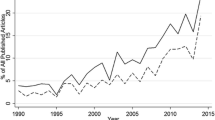Abstract
In this paper, we consider what may be done when researchers anticipate that in the implementation of field experiments, random assignment to experimental and control groups is likely to be flawed. We then reanalyze data from the Minneapolis Spouse Abuse Experiment in a manner that explicitly models violations of random assignment. As anticipated, we find far larger treatment effects than previously reported. The techniques developed should be useful in a wide variety of settings when random assignment is implemented imperfectly.
Similar content being viewed by others
References
Attorney General's Task Force on Family Violence (1984). U.S. Department of Justice, Washington, D.C.
Amemiya, T. (1985).Advanced Econometrics, Harvard University Press, Cambridge, Mass.
Bard, M. (1970).Training Police as Specialists in Family Crisis Intervention, U.S. Department of Justice, Washington, D.C.
Berk, R. A., and Sherman, L. W. (1988). Police responses to family violence incidents: An analysis of an experimental design with incomplete randomization.J. Am. Stat. Assoc. 83: 70–76.
Berk, R. A., Rauma, D., Loseke, D. R., and Berk, S. F. (1982). Throwing the cops back out: The decline of a local program to make the criminal justice system more responsive to incidents of domestic violence.Soc. Sci. Res. 11: 245–279.
Berk, R. A., Boruch, R. F., Chambers, D. L., Rossi, P. H., and Witte, A. D. (1985). Social policy experimentation: A position paper.Eval. Rev. 9: 387–429.
Commission on the Prevention of Drug and Alcohol Abuse (1986). Office of the Attorney General, Sacramento, Calif.
Cook T. D., and Campbell, R. T. (1979).Quasi-Experimentation: Design and Analysis Issues for Field Settings, Rand McNally, Chicago.
Fagin, J. A. (1978).The Effects of Police Interpersonal Communications Skills on Conflict Resolution, Ph.D. dissertation, Southern Illinois University, Carbondale (University Microfilms, Ann Arbor, Mich.).
Fienberg, S. E. (1980).The Analysis osf Cross-Classified Categorical Data, MIT Press, Cambridge, Mass.
Fienberg, S. E., Singer, B., and Tanur, J. M. (1985). Large-scale social experiments in the United States. In Atkinson, A. C., and Feinberg, S. E. (eds.),A Celebration of Statistics: The ISI Centenary Volume, Springer-Verlag, New York.
Goolkasian, G. A. (1986).Confronting Domestic Violence: The Role of Criminal Court Judges, National Institute of Justice, Washington, D.C.
Lawless, J. F. (1982).Statistical Models and Methods for Lifetime Data, John Wiley, New York.
Maddala, G. S. (1983).Limited-Dependent and Qualitative Variables in Econometrics, Cambridge Press, New York.
Parnas, R. I. (1972). The police response to domestic disturbance. In Radzinowitz, L., and Wolfgang, M. E. (eds.),The Criminal in the Arms of the Law, Basic Books, New York.
Reicken, H. W., and Boruch, R. F. (1974).Social Experimentation: A Method for Planning and Evaluating Social Intervention, Academic Press, New York.
Sherman, L. W., and Berk, R. A. (1984). The specific deterrent effects of arrest for domestic assault.Am. Sociol. Rev. 49: 261–271.
Sherman, L. W., and Hamilton, E. (1984).The Impact of the Minneapolis Domestic Violence Experiment: Wave I Findings, Police Foundation, Washington, D.C.
Tanur, J. M. (1983). Methods for large-scale surveys and experiments. In Leinhardt, S. (ed.),Sociological Methodology, 1983–1984, Jossey Bass, San Francisco.
Author information
Authors and Affiliations
Rights and permissions
About this article
Cite this article
Berk, R.A., Smyth, G.K. & Sherman, L.W. When random assignment fails: Some lessons from the Minneapolis Spouse Abuse Experiment. J Quant Criminol 4, 209–223 (1988). https://doi.org/10.1007/BF01072450
Issue Date:
DOI: https://doi.org/10.1007/BF01072450




